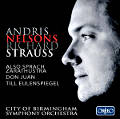ORFEO International – Catalogue
CDs
Andris Nelsons - Richard Strauss
In this year of Richard Strauss’s 150th birthday, it seems natural that the City of Birmingham Symphony Orchestra under Andris Nelsons should add another candle to the birthday cake, as it were, given that their recordings of Ein Heldenleben (Orfeo C 803 091) and An Alpine Symphony (C 833 111) were among the most successful, prize-winning recordings of recent years. This time, the CBSO and its music director Nelsons offer us a selection of the early tone poems: Don Juan, Till Eulenspiegels lustige Streiche and Also sprach Zarathustra. 
C 878 141 AIn Don Juan, Strauss succeeded for the first time in mixing the ingredients that would prove the basis of his success over the coming decades. Along with his big tunes and orchestral virtuosity, there is also a dash of immorality and a slightly wacky humour. Andris Nelsons and the CBSO plunge with delight into the Don’s life of adventure and conquest that comes to an abrupt halt in the final, general pause before he dies in a duel. The macabre end of Till Eulenspiegel, with the hanging of the protagonist, is preceded by a witty exploration of just about every possible orchestral timbre, with Strauss pulling out all the stops to depict Till’s pranks in music. The CBSO once again proves itself a world-class ensemble that is homogenous across all the sections of the orchestra. And this is just what’s needed for the great tone poem Also sprach Zarathustra, “freely based on Friedrich Nietzsche” (as Strauss himself wrote), in which the orchestra under Andris Nelsons achieves a marvellously subtle interpretation, doing equal justice to Zarathustra’s address to the sun and to the mysterious close in which the motives of Man and Nature alternate in their respective keys. In between these two extremes, Nelsons and the CBSO give absolutely everything that this score demands, from its storms of passion to its slithey fugues and the high camp of Zarathustra’s Dance Song. This new recording must undoubtedly already be counted among the highpoints of the current Strauss Year.
|